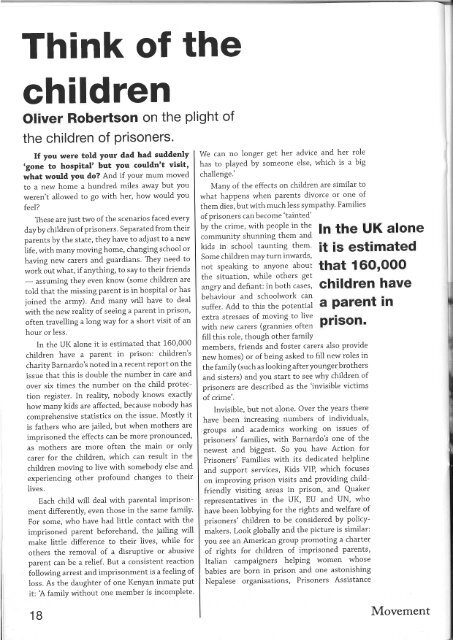Movement 134
You also want an ePaper? Increase the reach of your titles
YUMPU automatically turns print PDFs into web optimized ePapers that Google loves.
Think of the<br />
children<br />
Oliver Robertson on the Plight of<br />
the children of Prisoners.<br />
If you were told your dad had suddenly<br />
'gone to hospital' but you couldn't visit,<br />
what would you do? And if your mum moved<br />
to a new home a hundred miles away but you<br />
weren't allowed to go with her, how would you<br />
feel?<br />
These are just two of the scenarios faced every<br />
day by children of prisoners. Separated from their<br />
parents by the state, they have to adjust to a new<br />
life, with many moving home, changing school or<br />
having new carers and guardians. They need to<br />
work out what, if anything, to say to their friends<br />
- assuming they even know (some children are<br />
told that the missing parent is in hospital or has<br />
joined the army). And many will have to deal<br />
with the new reality of seeing a parent in prison,<br />
often travelling a long way fot a short visit of an<br />
hour or less.<br />
In the UK alone it is estimated that 160,000<br />
children have a parent in prison: children's<br />
charity Barnardo's noted in a recent report on the<br />
issue that this is double the number in care and<br />
over six times the number on the child protection<br />
register. In reality, nobody knows exactly<br />
how many kids are affected, because nobody has<br />
comprehensive statistics on the issue. Mostly it<br />
is fathers who are jailed, but when mothers are<br />
imprisoned the effects can be more pronounced,<br />
as mothers are more often the main or only<br />
carer for the children, which can result in the<br />
children moving to live with somebody else and<br />
experiencing other profound changes to their<br />
lives.<br />
Each child will deal with parental imprisonment<br />
differently, even those in the same family.<br />
For some, who have had little contact with the<br />
imprisoned parent beforehand, the jailing will<br />
make little difference to their lives, while for<br />
others the removal of a disruptive or abusive<br />
parent can be a relief. But a consistent reaction<br />
following arrest and imprisonment is a feeling of<br />
loss. As the daughter of one Kenyan inmate put<br />
it: A family without one member is incomplete'<br />
We can no longer get her advice and her role<br />
has to played by someone else, which is a big<br />
challenge.'<br />
Many of the effects on children are similar to<br />
what happens when parents divorce or one of<br />
them dies, but with much less sympathy. Families<br />
of prisoners can become 'tainted'<br />
by the crime, with people in the<br />
ln the UK alOne<br />
community shunning them and<br />
kids in school taunting them' it iS eStimatgd<br />
Some children may turn inwards,<br />
not speakins to anyone about that l6OrOOO<br />
the situation, while others get<br />
angryand defiant, i., uoir, ."r?r, Childfen haVe<br />
behaviour and schoolwork can<br />
suffer. Add to ,ht, ,h:;;;*t"i a Pargnt in<br />
ffiriff ::::,"J,;::l*:'i'; p ri so n .<br />
fill this role, though other familY<br />
members, friends and foster carers also provide<br />
new homes) or of being asked to fill new roles in<br />
the family (such as looking afteryoungerbrothers<br />
and sisters) and you start to see why children of<br />
prisoners are described as the 'invisible victims<br />
of crime'.<br />
Invisible, but not alone. Over the years there<br />
have been increasing numbers of individuals,<br />
groups and academics working on issues of<br />
prisoners' families, with Barnardo's one of the<br />
newest and biggest. So you have Action for<br />
Prisoners' Families with its dedicated helpline<br />
and support services, Kids VIP, which focuses<br />
on improving prison visits and providing childfriendly<br />
visiting areas in prison, and Quaker<br />
representatives in the UK, EU and UN, who<br />
have been lobbying for the rights and welfare of<br />
prisoners' children to be considered by policymakers.<br />
Look globally and the picture is similar:<br />
you see an American group promoting a charter<br />
of rights for children of imprisoned parents,<br />
Italian campaigners helping women whose<br />
babies are born in prison and one astonishing<br />
Nepalese organisations, Prisoners Assistance<br />
18<br />
<strong>Movement</strong>

















